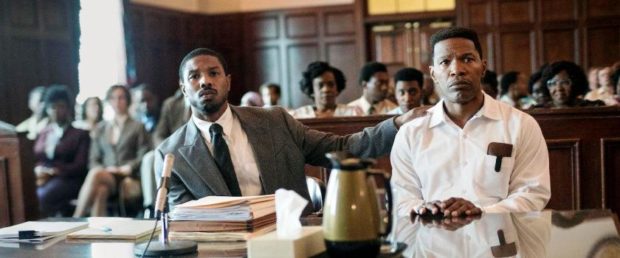 Tells the true story of a death row inmate, played by Jamie Foxx, who fights his unjust conviction with the help of a young lawyer played by Michael B. Jordan.
Bryan Stevenson is a lawyer, an African American, who founded the Equal Justice Initiative in 1989. The EJI provides legal assistance to prisoners on death row. Stevenson’s career expanded over the years to include involvement in a lot of civil and human rights issues. In 2014 he published a memoir that achieved considerable acclaim, “Just Mercy: A Story of Justice and Redemption.” Although the book profiles Stevenson’s early life and career in general, it focuses on one case in particular that he took on, that of Walter McMillian, a black pulp wood worker in Alabama who was wrongfully convicted of murder in 1988. Now the story has been made into a film. Directed by Destin Daniel Cretton, it’s called Just Mercy.
The film opens with McMillian, whose nickname for some unexplained reason is “Johnny D.,” getting stopped by police as he is driving home from work in June of 1987. Right away, we see how he puts his hands over the steering wheel to show that he is unarmed, and how carefully and fearfully he weighs his words when asked questions by the officer shining a flashlight on him. After being ordered out of the car with his hands up, he learns that he’s been arrested for the murder of an 18-year-old white woman seven months earlier. Johnny D. is played by Jamie Foxx, and it’s Foxx’s alert and passionate performance that centers the film.
The movie now introduces us to the young lawyer Bryan Stevenson, played by Michael B. Jordan. A Delaware native and Harvard Law School graduate, Stevenson decides to go to Alabama to work with death row inmates rather than take the possibly lucrative career that is open to him. There’s a scene where his worrying mother pleads with him to be careful. It’s the 1980s, but it’s still dangerous for a black man to fight for justice in the South. What we don’t learn in the film is that Stevenson was awarded a MacArthur grant to help him do this vital work. In any case, he comes to Montgomery only to find that the person who volunteered to help him, Eva Ansley (played by Brie Larson) got the office she had rented pulled away from her when the owner found out what it was going to be used for. Eventually they set up shop somewhere else, and Stevenson gets down to his work at the state prison.
When he reads up on McMillian’s case, he realizes that the evidence was incredibly flimsy. Everything rested on one witness, a felon telling an improbable story in order to get a better deal; while at the same time there are several witnesses confirming McMillian’s alibi, witnesses who were ignored by a police chief and a D.A. anxious to get a conviction in a case, the murder of this young woman, that prompted a lot of rage in the community. Stevenson decides to work towards getting a retrial, and although he knows it won’t be easy, it still ends up being a lot more difficult than he had anticipated.
Michael B. Jordan has become a star in a pretty short time, and in this movie he has a strong, solid presence, playing someone who lives by a simple faith that justice must be served, no matter what. Brie Larson is also fine as his sidekick. Two of the supporting actors are very impressive. Rob Morgan plays another death row inmate who has PTSD from his time in Vietnam. This man’s agony over his own actions—he did kill someone—and the nightmares and self-doubt that he can’t escape, really packs a punch here. Tim Blake Nelson is also on hand as the white man whose testimony convicted McMillian. He’s mentally unstable, and comes off at first as a contemptuous low-life, but then Nelson and the screenplay invest the character with unexpected nuance. Most of all, though, we have Jamie Foxx, a wonderful actor who I think doesn’t get enough good parts. His Johnny D. is a completely convincing character who alternates between bitterness and hope, while desperately trying to keep himself from cracking under the pressure.
This picture could easily have been ruined by a director trying to milk everything for tears and melodrama, but Cretton keeps thinks steady and on the level. What impresses me the most about this film is how it refuses to make all of this about just the one man and his case, but clearly draws the connections between poverty, white supremacy, and mass incarceration. Just Mercy becomes a film about our society as a whole, with its struggles and defeats as well as victories, and it tells us that we’re all a part of the problem, or the solution.
Tells the true story of a death row inmate, played by Jamie Foxx, who fights his unjust conviction with the help of a young lawyer played by Michael B. Jordan.
Bryan Stevenson is a lawyer, an African American, who founded the Equal Justice Initiative in 1989. The EJI provides legal assistance to prisoners on death row. Stevenson’s career expanded over the years to include involvement in a lot of civil and human rights issues. In 2014 he published a memoir that achieved considerable acclaim, “Just Mercy: A Story of Justice and Redemption.” Although the book profiles Stevenson’s early life and career in general, it focuses on one case in particular that he took on, that of Walter McMillian, a black pulp wood worker in Alabama who was wrongfully convicted of murder in 1988. Now the story has been made into a film. Directed by Destin Daniel Cretton, it’s called Just Mercy.
The film opens with McMillian, whose nickname for some unexplained reason is “Johnny D.,” getting stopped by police as he is driving home from work in June of 1987. Right away, we see how he puts his hands over the steering wheel to show that he is unarmed, and how carefully and fearfully he weighs his words when asked questions by the officer shining a flashlight on him. After being ordered out of the car with his hands up, he learns that he’s been arrested for the murder of an 18-year-old white woman seven months earlier. Johnny D. is played by Jamie Foxx, and it’s Foxx’s alert and passionate performance that centers the film.
The movie now introduces us to the young lawyer Bryan Stevenson, played by Michael B. Jordan. A Delaware native and Harvard Law School graduate, Stevenson decides to go to Alabama to work with death row inmates rather than take the possibly lucrative career that is open to him. There’s a scene where his worrying mother pleads with him to be careful. It’s the 1980s, but it’s still dangerous for a black man to fight for justice in the South. What we don’t learn in the film is that Stevenson was awarded a MacArthur grant to help him do this vital work. In any case, he comes to Montgomery only to find that the person who volunteered to help him, Eva Ansley (played by Brie Larson) got the office she had rented pulled away from her when the owner found out what it was going to be used for. Eventually they set up shop somewhere else, and Stevenson gets down to his work at the state prison.
When he reads up on McMillian’s case, he realizes that the evidence was incredibly flimsy. Everything rested on one witness, a felon telling an improbable story in order to get a better deal; while at the same time there are several witnesses confirming McMillian’s alibi, witnesses who were ignored by a police chief and a D.A. anxious to get a conviction in a case, the murder of this young woman, that prompted a lot of rage in the community. Stevenson decides to work towards getting a retrial, and although he knows it won’t be easy, it still ends up being a lot more difficult than he had anticipated.
Michael B. Jordan has become a star in a pretty short time, and in this movie he has a strong, solid presence, playing someone who lives by a simple faith that justice must be served, no matter what. Brie Larson is also fine as his sidekick. Two of the supporting actors are very impressive. Rob Morgan plays another death row inmate who has PTSD from his time in Vietnam. This man’s agony over his own actions—he did kill someone—and the nightmares and self-doubt that he can’t escape, really packs a punch here. Tim Blake Nelson is also on hand as the white man whose testimony convicted McMillian. He’s mentally unstable, and comes off at first as a contemptuous low-life, but then Nelson and the screenplay invest the character with unexpected nuance. Most of all, though, we have Jamie Foxx, a wonderful actor who I think doesn’t get enough good parts. His Johnny D. is a completely convincing character who alternates between bitterness and hope, while desperately trying to keep himself from cracking under the pressure.
This picture could easily have been ruined by a director trying to milk everything for tears and melodrama, but Cretton keeps thinks steady and on the level. What impresses me the most about this film is how it refuses to make all of this about just the one man and his case, but clearly draws the connections between poverty, white supremacy, and mass incarceration. Just Mercy becomes a film about our society as a whole, with its struggles and defeats as well as victories, and it tells us that we’re all a part of the problem, or the solution.

I’m a senior in the Neuroscience and Cognitive Science program at the University of Arizona. I’ve been interested in science my whole life, but...


The Pima Canyon Trail features water, archaeological sites, and , in the winter, ice climbing. Join the Southwestern Trails Community and find more content...